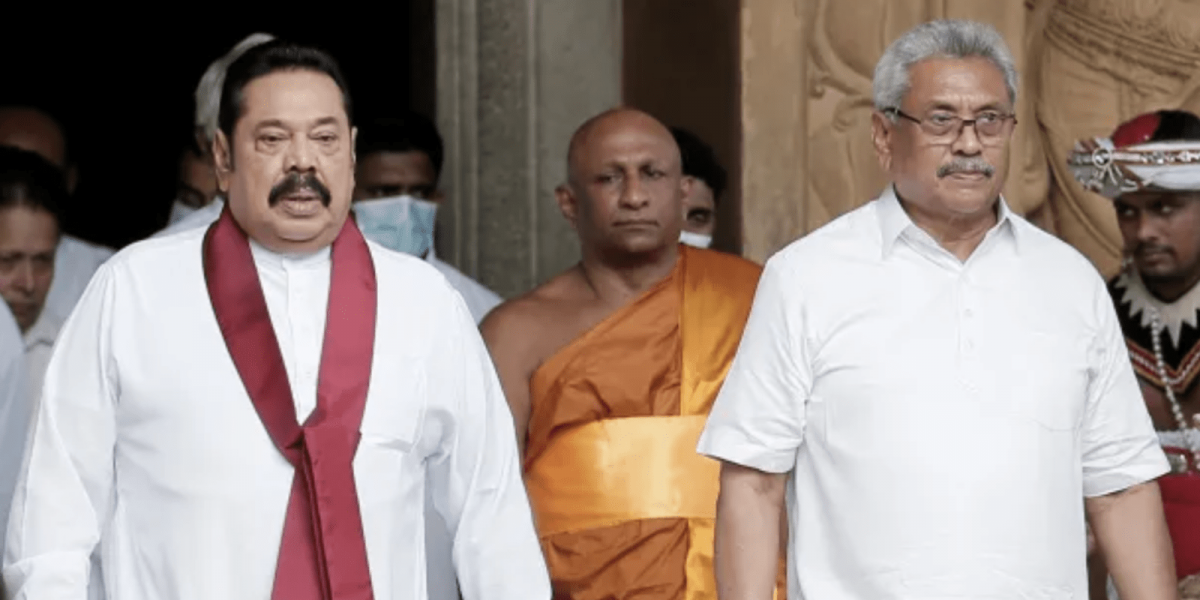In an historic move in January 2023, the Canadian government announced sanctions on Sri Lanka’s powerful Rajapaksa brothers, marking the first time that Ottawa has barred any Sri Lankan government officials and the first sanctions anywhere in the world targeting the Rajapaksa clan. For the perpetrators of the 2009 Tamil genocide, the net has closed a little bit tighter.
Though years have passed since the brutal end of the country’s armed conflict, ethnic tensions remain high after Mahinda Rajapaksa and his younger brother Gotabaya oversaw a massive military offensive that culminated in 2009. Under the siblings, a revamped and expanded Sri Lankan military defeated the Liberation Tigers of Tamil Eelam (LTTE) and launched a devastating blitz in the island’s North-East. Tens of thousands of Tamil civilians were killed, many who surrendered were executed, sexual violence was deployed on a large scale, and hospitals were repeatedly bombed in the process. Almost 14 years later, no single person has been tried over the crimes committed.
Operating with impunity
Despite overseeing atrocities that have become the subject of several United Nations reports, the Rajapaksas roamed freely and were even praised for their military conquests. Indeed, after 2009, the siblings continued to win elections with extremist ethno-nationalist politics. In 2019, after a brief stint out of office, Gotabaya Rajapaksa was elected as president of Sri Lanka, with large support from the electorate, and despite constant resistance to Rajapaksa’s rule from the Tamil homeland in the North-East.
In July 2022, unprecedented protests over the state of the economy forced Rajapaksa out of office and drove him out of the country, but he has since returned to Sri Lanka almost entirely unscathed and continues to command significant support. The brothers are now steadily planning their return to power, frequenting rallies and holding political meetings. With accountability for the massacres still a contested issue, the Rajapaksas seemed to be in as comfortable a position as ever.
Military occupation of the Tamil homeland
The Tamil people, meanwhile, continue to face ongoing discrimination and an overwhelming occupation. Sri Lanka’s military is more than three times the size of Canada’s armed forces, which continues to occupy vast swathes of land across the Tamil regions. War criminals that have committed rapes and executions remain within its ranks. The failure of years of domestic commissions and of last year’s ‘aragalaya’ protests to hold the Rajapaksas accountable was just the latest in a series of events that proved to many what the Tamil people had repeatedly and loudly voiced for years: Sri Lanka’s institutions are incapable and unwilling to account for crimes committed against them. Justice seemed to be evaded at almost every turn.
Surveillance and criminalization
The latest announcement means that the Rajapaksas and two other Sri Lankan soldiers accused of war crimes will have any Canadian assets frozen and banned from entering the country.
But how did the Tamil Canadian community, one that has battled through criminalization and discrimination in Canada, achieve this vital victory? Eelam Tamils have endured decades of scrutiny and harassment by Canada’s police and intelligence agencies for their support of the Tamil national liberation struggle. When the community held public events, it became almost routine to face harassment from the RCMP and venues would frequently be withdrawn.
When asylum seekers arrived by boat in the 1980s and following the genocide in 2009, Tamils were routinely labelled queue jumpers, human smugglers, and terrorists by the media and right-wing politicians. When thousands protested in cities like Toronto and Ottawa to stop the unfolding genocide in 2009, politicians were reluctant to meet activists or speak at rallies. Many refused to meet community leaders entirely. As demonstrators called for a ceasefire and humanitarian access, Tamil Canadians were depicted at worst as terrorists and at best as an inconvenience.
But in the aftermath of the genocide and with the support of allies, the community has never stopped resisting.
Sustained Tamil organizing
From staging legal challenges against deportation to mistreatment in Sri Lanka, to persevering against accusations of “terrorism,” the community has fought an uphill battle for decades to ensure their voices are heard and their struggle supported. Following the 2009 genocide, a period that continues to have deep scars on the Tamil diaspora worldwide, the community rallied. There was remarkable resilience, from grassroots organizing in the suburbs of Toronto, to lobbying lawmakers in Ottawa on the need for justice on the island. They have been joined by years of tireless efforts from campaigners worldwide to hold perpetrators to account, including civil lawsuit cases filed against Gotabaya in California and early morning protests outside his hotel room in Scotland when he visited in 2021.
This persistent organizing and unwavering commitment to achieving justice undoubtedly drove Ottawa’s latest decision. The community’s relentless advocacy and remarkable achievements have become impossible to ignore and are finally being recognised. There now seems to be more tangible signs of progress.
For Canada, which last year had its parliament recognize May 18 as Tamil Genocide Remembrance Day, the move is an expression of the intense political pressure created by Tamil Canadians who have demanded accountability for Sri Lanka’s long history of war crimes. It also sends a message to Sri Lanka’s government: Tamils worldwide will not rest until they get justice for their suffering.
Just over a decade ago, many in the political mainstream were reluctant to acknowledge the genocide that the Tamil people endured, much less their longstanding aspirations for freedom and self-determination. But out of the carnage of the massacres, Tamil Canadians kept organizing. The public debate about Sri Lanka has now shifted. The community is more and more defining the narrative and helping ensure that war criminals like the Rajapaksa brothers cannot operate with impunity on the global stage.
What impact?
Though none of the listed individuals may have ever planned to travel to Canada, the sanctions will have a wide-ranging impact, and not just for those four men. First, it demonstrates to the Rajapaksas, and other Sri Lankans accused of war crimes, that there is a clear knowledge of the chain of command that bears responsibility for the crimes committed: from the soldier who slit the throats of Tamil children, to the former presidents who gave orders to “finish it all off.” The crimes that took place go beyond the actions of individual soldiers. It was a systematic and deliberate process.
It also shows that, on the international stage, the net is tightening around those who committed mass atrocities, potentially paving the way for other governments worldwide to do the same. The United States, where Gotabaya Rajapaksa was once a resident and may still hold assets, already barred the former head of Sri Lanka’s army from entry over war crimes. More names, including the Rajapaksas, may follow.
But only if the community and their allies continue to organize and keep the heat on their own governments.
Neither the Rajapaksas nor any other accused war criminals have been held accountable yet, and successive governments in Colombo continue to oppose demands for perpetrators to face criminal trials. Coordinated action at the United Nations and in other global fora will be required to ensure that an internationalized justice process is enacted, as survivors of the massacres have demanded. Forming an independent and internationalized mechanism is an important step in this direction. Though Tamil Canadians, including those who survived the genocide, will feel safer with the latest announcement, thousands of Eelam Tamils are still attempting to flee the island and its oppression. Like other Western states, Canada must ensure that those fleeing persecution are granted the protection they deserve.
Opportunism?
While the Canadian government has framed its move as a response to gross violations of human rights, questions remain over Ottawa’s own political and economic interests in the region. Canada’s policies on Sri Lanka have thus far contributed little to tackling the longstanding hegemony on the island, and instead over the years strengthened ethnic and class divides. More of the same will not suffice. This distinction is key for the movement demanding accountability; the Canadian state and other Western governments have to be pushed from below, with mass pressure from the community and allies, to move them towards actions that come closer to justice.
Likewise, the mass protests that took place across Sri Lanka last year, regardless of their outcomes, played a significant role in isolating the Rajapaksas and, for a moment, opened up more room to build working-class solidarity between Sinhala and Tamil people, who could see more clearly their common interests in the fight for economic justice. Those links must be forged more strongly, and Sri Lanka’s southern protestors must show a willingness to understand and accommodate Tamil demands for justice and liberation.
As activists aim to deepen the Rajapaksas’ isolation on the world stage, they must continue to build pressure from below on their own governments, and seize every opportunity for working-class unity in whatever struggles are underway in Sri Lanka and among the diaspora abroad.
And when the movements achieve this, they will further tighten the net around Sri Lanka’s most powerful siblings, who must now watch carefully wherever they try to move in the world.
Did you like this article? Help us produce more like it by donating $1, $2, or $5. Donate


